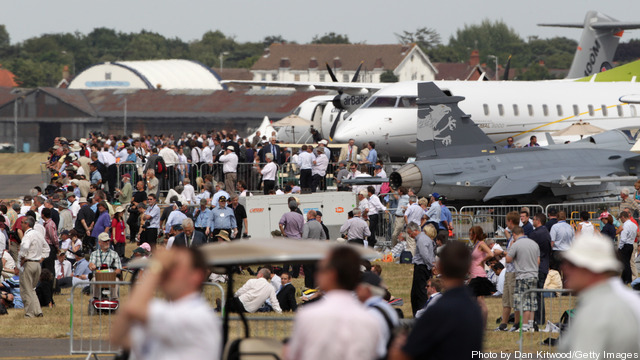Grim Watch at Farnborough: How Far Will US, Euro Defense Spending Fall
Posted on

The ebb and flood of transatlantic defense relations has long been in evidence at the Farnborough air show, at the political and industrial level both. A question on the minds of many of the more than 100,000 daily attendees will be just how low the spending tide could eventually drop, as Washington’s interest is now focused firmly on another ocean while Europe flounders in debt.
The 2012 show is the aerospace and defense industry’s first full opportunity to come together since the U.S. administration’s revised strategic guidance outlined ‘re-balancing’ toward the Asia Pacific, while sustaining its commitment in the Middle East. Europe, for more than half a century the preoccupation of US defense interest, also became the subject of a “strategic opportunity to re-balance.” In keeping with the general tenor of the defense debate in Europe this is certain to be in terms of a withdrawal.
While the January 2012 strategic guidance – “Sustaining U.S. Global Leadership” – cast “most European countries” as “producers of security rather than consumers of it,” this was rather at odds with the concerns of former U.S. Defense Secretary Robert Gates. His parting assessment of the state of transatlantic defense relations in mid-2012 shortly before he stepped down was “there will be dwindling appetite and patience in the U.S. Congress and in the American body politic writ large – to expend increasingly precious funds on behalf of (European NATO) nations that are apparently unwilling to devote the necessary resources or make the necessary changes to be serious and capable partners in their own defense. Nations apparently willing and eager for American taxpayers to assume the growing security burden left by reductions in European defense budgets.”
There is nothing new in US officials bemoaning the state of European defense expenditure. What is changing is Washington’s strategic outlook. Its world is no longer viewed through the prism of the Cold War and the inevitable focus on Europe, nor is its military horizon limited now to counter-insurgency operations in Afghanistan and against the al Qaeda diaspora. “Over the long term, China’s emergence as a regional power will have the potential to affect the U.S. economy and our security in a variety of ways,” is the U.S judgment that underpins the revised strategic guidance.
It is not necessarily a view that is shared in all the capitals of Europe. At least during the Cold War Washington and its European allies all recognized the same threat.
The US shift by its very nature will only begin to be felt over time, and there was a likely declamatory element to what was known for a short period only as a “strategic pivot” intended to be heard in Beijing and other Asian capital cities. Similarly any impacts on transatlantic relations in the defense aerospace sphere will also play out only over the coming years.
Irrespective of the tenor of Gates comments and NATO’s “Smart Defense Initiative” there is little chance of Europe really addressing the capability gaps that remained manifest even in the successful intervention in Libya. That the NATO Alliance Ground Surveillance program has been heralded as an exemplar of smart defense should perhaps be regarded as a caution against over optimism – the project has taken two decades to come to fruition. This is irrespective of the recognition of the intelligence, surveillance and reconnaissance capability gap evident in many NATO nations.
The immediacy of economic woes on both sides of the the pond remains a more pressing concern. These continue to impact defense, with associated ramifications for the aerospace industry. The threat of sequestration and the implications for the Pentagon’s defense program continues to cast a long shadow in Washington. For Europe the travails of the common currency, and ensuing doubts over the grand political vision of a unified continent, are placing defense expenditure under relentless pressure. While the withdrawal from Afghanistan in 2014 will provide some respite, the security environment presents numerous other challenges, ones that Europe is presently not equipped fully to deal with.
The pressures on the European defense aerospace industry could also act as a prompt for further industrial consolidation. There remains a possibility that some companies could choose to exit the defense aerospace sector completely. The near-term financial turmoil is also – unfortunately – completed by uncertainty as to a medium term developmental roadmap for the European sector. There is as yet no fully-funded research and development program – manned or unmanned — beyond the present generation of combat aircraft now in production. A Franco-British unmanned combat air vehicle project – an element of the Anglo-French Treaty – presently looks to provide the best hope as the kernel of a broader European effort. The project however, will require political will and strategic intent, the availability of which cannot be guaranteed.
Douglas Barrie is senior fellow for military aerospace at London’s International Institute for Strategic Studies. He was London bureau for Aviation Week and, before that, Defense News.
Subscribe to our newsletter
Promotions, new products and sales. Directly to your inbox.
